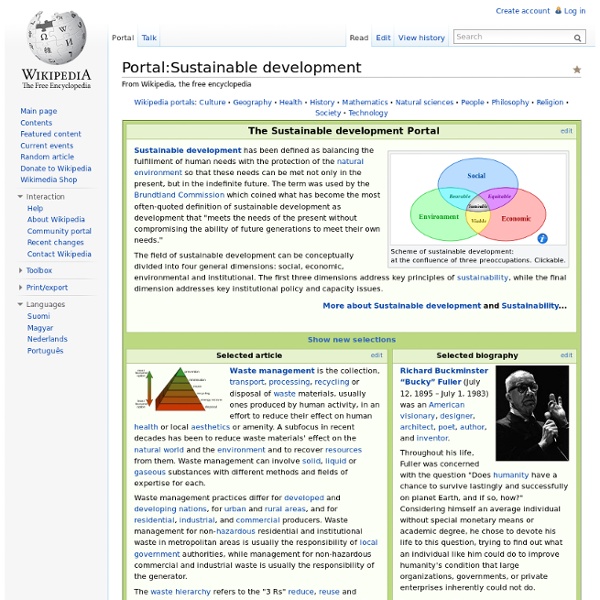



Cool Temperate - Welcome Environmental education Environmental education (EE) refers to organized efforts to teach about how natural environments function and, particularly, how human beings can manage their behavior and ecosystems in order to live sustainably. The term is often used to imply education within the school system, from primary to post-secondary. However, it is sometimes used more broadly to include all efforts to educate the public and other audiences, including print materials, websites, media campaigns, etc. Related disciplines include outdoor education and experiential education. Environmental education is a learning process that increases people's knowledge and awareness about the environment and associated challenges, develops the necessary skills and expertise to address the challenges, and fosters attitudes, motivations, and commitments to make informed decisions and take responsible action (UNESCO, Tbilisi Declaration, 1978). Focus[edit] Environmental education focuses on: Related fields[edit] History[edit]
List of permaculture projects This is list of examples of permaculture projects and practitioners. The largest collection of permaculture projects and practitioners around the world, can be found on the Worldwide Permaculture Network website.[1] Africa[edit] Zimbabwe has 60 schools designed using permaculture, with a national team working within the schools' curriculum development unit. Other countries have permaculture farms as well. Arab countries[edit] A permaculture project has been developed in Jordan by the Permaculture Research Institute headquartered in Australia and run by Geoff Lawton. Oceania[edit] Australia[edit] The development of permaculture co-founder David Holmgren's home plot at Melliodora, Central Victoria, has been well documented at his website and published in e-book format.[3] Geoff Lawton's Zaytuna Farm next to The Channon in northern NSW, Australia, is a 66-acre medium-farm scale example of permaculture implementation. Tikopia[edit] New Zealand[edit] Indonesia[edit] Thailand[edit]
Category:Sustainability From Wikipedia, the free encyclopedia Subcategories This category has the following 33 subcategories, out of 33 total. Pages in category "Sustainability" The following 200 pages are in this category, out of 224 total. This list may not reflect recent changes (learn more). (previous 200) (next 200)(previous 200) (next 200) Sustainability Achieving sustainability will enable the Earth to continue supporting human life. In ecology, sustainability is how biological systems remain diverse and productive. Long-lived and healthy wetlands and forests are examples of sustainable biological systems. Healthy ecosystems and environments are necessary to the survival of humans and other organisms. Despite the increased popularity of the use of the term "sustainability", the possibility that human societies will achieve environmental sustainability has been, and continues to be, questioned—in light of environmental degradation, climate change, overconsumption, population growth and societies' pursuit of indefinite economic growth in a closed system.[3][4] Etymology[edit] The name sustainability is derived from the Latin sustinere (tenere, to hold; sub, up). Components[edit] Three pillars of sustainability[edit] Circles of sustainability[edit] Resiliency[edit] History[edit] Principles and concepts[edit] Scale and context[edit] Land use[edit]
Education for Sustainable Development Sustainability education (ES), Education for Sustainability (EfS), and Education for Sustainable Development (ESD) are interchangeable terms describing the practice of teaching for sustainability. ESD is the term most used internationally and by the United Nations.[1] Agenda 21 was the first international document that identified education as an essential tool for achieving sustainable development and highlighted areas of action for education. Background[edit] Groundwork has been laid for sustainability education worldwide. Envisioning – being able to imagine a better future. The premise is that if we know where we want to go, we will be better able to work out how to get there.Critical thinking and reflection – learning to question our current belief systems and to recognize the assumptions underlying our knowledge, perspective and opinions. The Green Education Foundation (GEF) promotes sustainability education with a K-12 curriculum. The objectives of the DESD are to: U.S. The U.S.
Introduction What is Wikipedia? Click "Edit" to change an article Editing tutorial for Wikipedia Wikipedia is a free encyclopedia, written collaboratively by the people who use it. It is a special type of website designed to make collaboration easy, called a wiki. Many people are constantly improving Wikipedia, making thousands of changes per hour. How you can contribute Don't be afraid to edit – anyone can edit almost every page, and we are encouraged to be bold! Remember – you can't break Wikipedia; all edits can be reversed, fixed or improved later. Donate – Wikipedia is free to use, but relies on donations and grants to do so. Why not try out the editor right now? Click here to edit the sandbox, a place to make test edits.